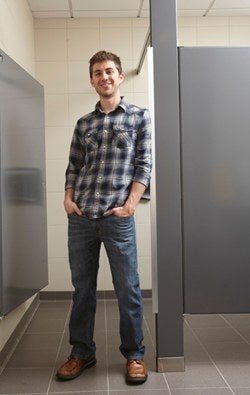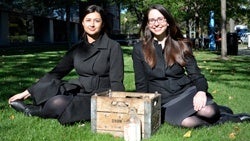Related Topics
Social media campaign could help stop teen drivers from texting
With a growing number of teens texting behind the wheel, policy makers are looking for ways to combat this risky behavior. One blueprint that could work is the successful “designated driver” campaign attacking drunken driving led by Harvard…
Benefits of early education program for at-risk kids don’t extend to siblings
A child development program shown to improve IQ and behavior among children born with a low birth weight did not help their younger siblings, according to a study led by Harvard School of Public Health’s [[Marie McCormick]], Sumner…
Accentuating the positive
[ Spring/Summer 2012 ] It’s an all too common scene: A girl looks at a photo in a fashion magazine and compares the model’s thin, airbrushed figure to her own rounder shape. She tells her friend, “I am…

Positive feelings may help protect cardiovascular health
For immediate release: Tuesday, April 17, 2012 Boston, MA – Over the last few decades numerous studies have shown negative states, such as depression, anger, anxiety, and hostility, to be detrimental to cardiovascular health. Less is known about…

Most Americans support reducing nicotine levels in cigarettes to stop children from taking up smoking
A vast majority of U.S. adults support reducing nicotine in cigarettes to below nonaddictive levels if it means fewer children and adults will become addicted to cigarettes, according to a new study led by Harvard School of Public Health…
Savor every bite with mindful eating
Eating more slowly and relishing each bite could help people eat less or eat healthier, according to Lilian Cheung, lecturer in the Department of Nutrition at Harvard School of Public Health. Cheung, who also is the editorial director…
Use anti-smoking tactics to combat obesity
While overall cancer death rates in the United States have decreased over the past two decades, increasing numbers of people are suffering from obesity-related cancers such as esophageal, pancreatic, liver, and kidney cancers, according to the American Cancer…
For rescuers, effects of Carmel fire linger on
Coverage in the Jerusalem Post, December 17, 2011, of study led by visiting scientist Eric Amster
HSPH student helps Mass. Department of Public Health analyze raw milk distribution
[ Winter 2012 ] With the continuing trend toward ever-more “natural” diets, the raw milk debate has gathered steam, including here in Massachusetts where lawmakers have been considering legislation to loosen restrictions on selling raw milk for the…

Poor pay linked to worker depression
Coverage in UPI, November 23, 2011, featuring HSPH's Cassandra Okechukwu